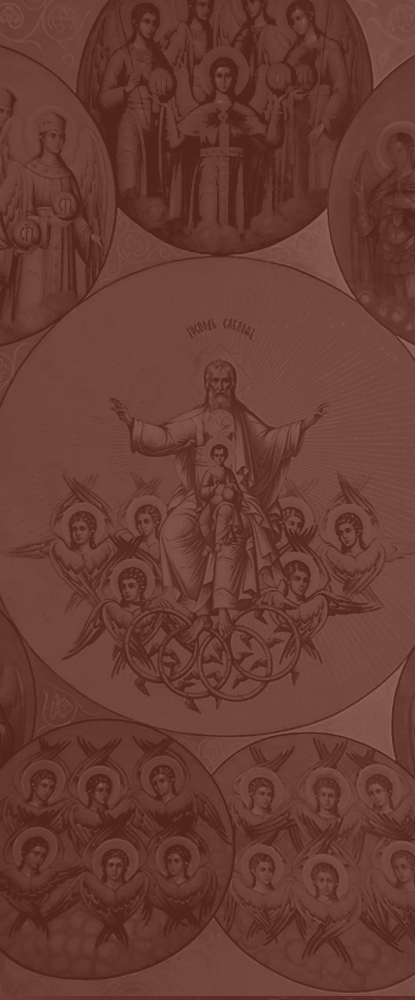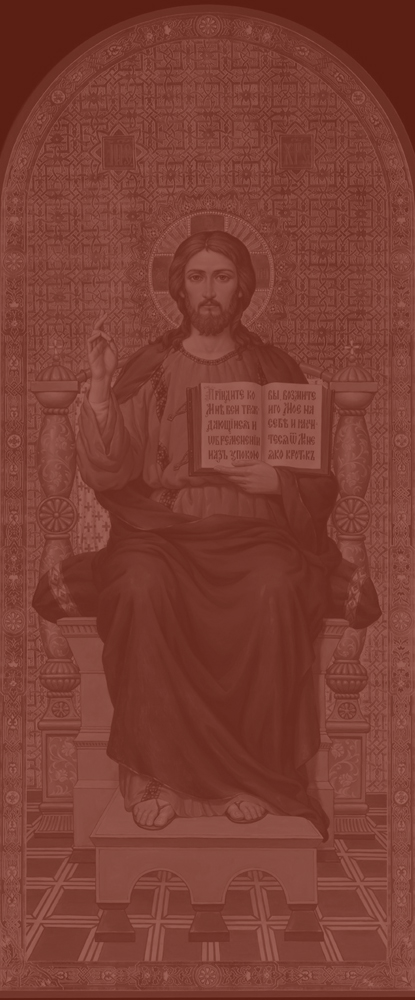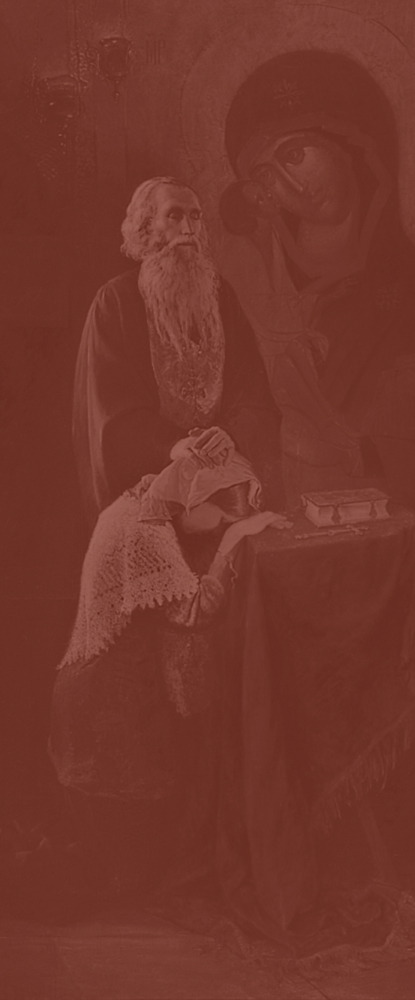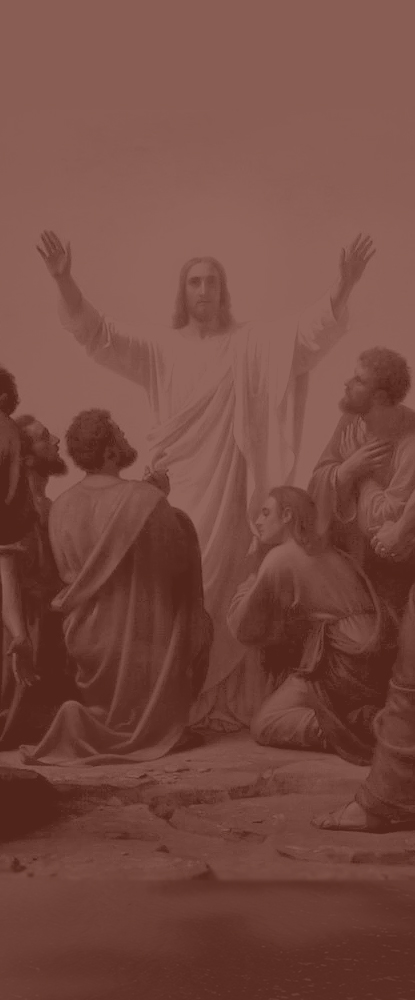SOMEBODY TOUCHED ME
Archpriest Sergiy Baranov
Holy Trinity Cathedral, Iveron monastery of Orsk
November 11, 2023
In the Name of the Father, and of the Son, and of the Holy Spirit!
In today’s Gospel, we read how the father of a dying daughter met the Lord and asked Him to come and heal his daughter. When our Lord was on his way, the following event happened. There was a woman who had been suffering from a flow of blood for many years. As it is written in the Gospel, she “spent all her livelihood on physicians”1 hoping to be healed. So her livelihood was spent, but she was not healed. It was her last hope. She somehow squeezed through this crowd to touch “the hem of His garment.”2 She said to herself, “If only I may touch His garment, I shall be made well.”3 Suddenly the Lord, Who was surrounded by a crowd of people, stopped and said these words, strange for everybody, “Who touched Me?”4 The Apostle Peter said, “Master, the multitudes throng and press You, and You say, ‘Who touched Me?’”5 And God says, “Somebody touched Me, for I perceived power going out from Me.”6 This power healed the poor woman immediately. This power could heal in an instant but doctors had not been able to for many years. She was almost desperate to find a doctor.
Look, I want to draw your attention to the fact that this power is quite tangible and God perceived power going out from Him. The sick woman could definitely feel how this power entered her. This is Divine grace and it is not an illusion. It is very precise and tangible and you live through it not like “somehow” or “maybe” but you experience it rather definitely, precisely. Divine grace indeed. All other emotional feelings are experienced in a quite vague and complicated way, they make us think a lot, they distract our mind. When God does something, He does it precisely, shortly, simply and tangibly.
Once, St. Gregory Palamas argued with a theological theoretic, Varlaam. It happened in Greece. Varlaam had profound knowledge but he did not have Divine grace. Knowledge without Divine grace can make you feel superior and get crazy. So this self-centred theologian came to Athos and communicated with the Athonite monks. They told him in simple words how they were living there being in Divine grace. They told him that they were living in the Uncreated Light, that they could see this light, it went through them and this light was tangible enough and real. And this—in old Slavonic language “витийствующий” cunning (old English), which can be translated to modern Russian as “мудрствующий от своего ума” “self-wise” (modern English) – theologian without any understanding of what the Athonites were talking about, started laughing at them. “What Uncreated light? What Divine grace?” Our Lord is so transcendent and inconceivable. What can you experience there, what light, what Divine grace?” Well, maybe he could have humbled himself a little before these Holy Fathers and their way of living. Well, maybe he could have compared his life to their life at least. He lived in a capital, he was favoured by the Emperor, he was not hungry nor cold, he was in honour and had all the privileges of a man of science. He could have compared himself to them and their way of living. All their lives are dedicated to Lord only, they refused things of this world, they put them apart. Only the Lord. Can you imagine this? All their power is focused on God only. Nothing can distract them, they are focused on God only. And how could you argue with them, poor man. Your theory was just beating around the bush. But them, they concentrate straight on the Lord. Not only did you argue with them, but you also dared to mock them. And he started to laugh, “What Uncreated Light? Is this a vision about an atmospheric phenomenon?” Or what arguments did he make there?
St Gregory Palamas, an Athonite monk, left Athos, silence and dedication, for Thessaloniki to have a discussion with this heretic, who was blaspheming Divine grace. There are these words in the Gospel when the Lord says, “Therefore I say to you, every sin and blasphemy will be forgiven men, but the blasphemy against the Spirit will not be forgiven men.”7 “Every sin will be forgiven” means that you will be forgiven after proper repentance. So, St. Palamas left Athos to overwhelm this blasphemer of Divine grace. And he managed this. He held a Church Council and proved that Athonite monks, being in Divine grace immensely, being in contemplation, could see God’s light, which the Apostles saw on Mount Tabor when the Lord’s Transfiguration happened. They were all in it, this light was not only outside but they were penetrated by it from inside as well, this light did not have any direction and everything around was immersed in this light. This way the Apostles lived through God’s Light, this way the Athonites lived through the Uncreated Light. Their sincerity, repentance and steady spiritual life of many years helped them to live this way. They were immersed in this light when contemplating.
Well, the word “see” maybe is not a correct one to describe this light because we can see only what is in front of us. But the Uncreated Light, when it enlightens a person, shines both outside and inside. It penetrates everything around and you stop realising these terms where everything is different for you now.
However, I want to say something else, something responsible. Divine grace is very tangible and existential. It acts not “somehow” but in a very precise way. But how can we not confuse the action of Divine grace to our emotional feelings and some thrills? We know many examples in Church history when people could not differentiate demons’ influence from the action of Divine grace. They perceived evil action as Divine one. This way they were impaired and defeated by evil. How can we differentiate Divine grace from emotional thrills, which are imposed, first, by satan and then by ourselves—we generate and imagine it on our own from the very beginning.
I believe Apostle Paul would answer this question better considering that he lived through Divine grace in some tremendous way—he was taken up to the third Heaven. The Lord, as He desired, according to His Divine Providence, took a fallen, sinful and quite material man to Heaven. This man saw tremendous things there which he could not even describe. He says, “I saw something, but I cannot even say what I saw there. I heard something but I cannot say what I heard because all of it was non-earthy, beyond our understanding.”
Well, this man acquired tremendous Divine grace, it was an incredible rise to Heaven, and look at his first reaction, feeling and impression. He says, “The Lord was seen after His Resurrection by many Apostles or one by one, or by all together and—he said here the key phrase – “Then last of all, He was seen by me also, as by one born out of due time.”8 Not only were these words based on the fact that he was a cruel person, but he also asked the Sanhedrim to give him a paper which would allow him to go around the world and search for Christians, torture and kill them. It was not the only reason why he was saying that he was a “great monster.” All Holy Fathers who experienced special Divine grace claimed the same thing. They considered themselves to be monsters in contrast with Divine grace. If I go to some den of drug addicts, alcoholics or murderers, I will probably look nice in this place, won’t I? But if I am in Divine grace that is the purest light, in contrast to it I will be the darkest gloom.
Therefore, this is the best tool, point or attribute to understand what you do deal with—Divine grace or your own feelings or devil. When Divine grace comes, you consider yourself a real monster in contrast with the purity and sacrality of God’s grace. You cannot feel it in a different way. The Old Testament Holy Fathers, New Testament Holy Fathers fell down on their knees and cried in tears, “Lord, to me, the monster, You came.” They could not hold their tears back from the feeling of love and shame as well.
On the contrary, if you experience another condition like, “Finally. I have been practising the Jesus prayer for half of a year. Finally, God came!” Even the Schemanun here laughs. God, deliver us from evil. If something comes to you, and you do not consider yourself monster in contrast to it, but you feel worthy of God, “Yes, I worked sincerely, I did prostrations, I prayed, I donated to charity, I did everything and it happened finally” – that is it, you are at the very bottom. Moreover, it is even worse—you are below zero, a minus. It is impossible to experience different feelings because you are just filth. Try to remember your confession. Or try to remember not just “one confession” but all of them. Every time, from one confession to another, we do the same sins, the same sins—filth, stench and lie. Well, how we should feel if Divine grace comes indeed. We should fall down and close our eyes, bury our heads in our hands as Moses and Elijah the Prophet did.
Once on Athos, there was a story. A devil, who pretended to be an angel, knocked at a monk’s door. The monk opened the door and the devil, who pretended to be an angel, said, “Father Porphyrius, your prayer reached God and He sent me to take you to Heaven.” To which this spiritually simple man, this childish soul—childish here means mildness, simplicity but not stupidity—so, he answered immediately, he did not even get that it was devil, he answered, “Oh, sorry, but it is not me. You should go to John’s cell, he is a real holy man but you are mistaken with my cell” – he said it sincerely, from the heart; he could not even understand that it was the devil because he was very simple and pure. His purity of heart immediately realised that it was not him to whom He may come, this cell is wrong. “You need that cell which is two cells further— a holy man lives there but me, I barely did my prayer rule, Lord have mercy on me.”
We should not blaspheme Divine grace with our imagined feelings, which were created by our ignorance and vanity. We should have a reverent and serious attitude to it and be very careful. At the same time, we should not bring Divine grace to shame when it comes. How can we do that? Cry.
Glory to God, both now and ever, and unto the ages of ages!
1Luke.8:43
2Luke.8:44
3Mat.9:21
4Luke.8:45
5Luke.8:45
6Luke.8:46
7Mat.12:31
81Cor.15:8




